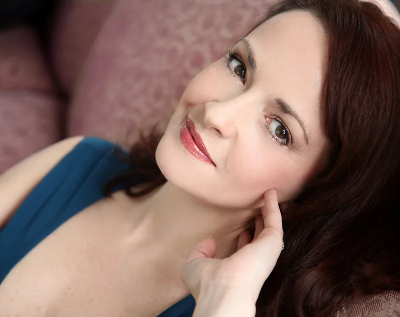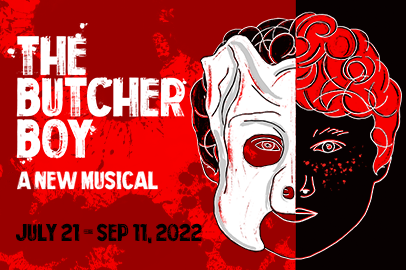GETTING TO THE MEAT OF HER CAREER
Michele Ragusa is blessed and touched by the theater Gods — they’re real, trust us. Her career in theater is simply glowing, full of variety, and seemingly constant, conquering both musical comedy and drama. Her resume of credits is thrilling: On Broadway, Michele has recently created the role of Austin in Flying Over Sunset (written and directed by James Lapine) and has also appeared as Elizabeth in Young Frankenstein, Pennywise in Urinetown, Evelyn Nesbit in Ragtime, Caroline in Titanic, Mona in A Class Act, and the Novice in Cyrano. Off-Broadway credits include Christopher Durang’s Adrift In Macao, and Craving for Travel at Playwrights Horizons. She also appeared in the 20th Anniversary Concert of Titanic at Lincoln Center.
Regionally, she has starred in Gypsy, Grand Hotel, The Boy From Oz, Bullets Over Broadway, Mame, Hello, Dolly!, Lend Me A Tenor, Annie, Boeing, Boeing, Thoroughly Modern Millie, A Funny Thing Happened on the Way to the Forum, The King and I, Spamalot, Sweeney Todd, Singin’ in the Rain, Into the Woods, Kiss Me, Kate, The Drowsy Chaperone, Company, Mary Poppins, Guys and Dolls, and The Full Monty. On TV, she’s been seen in Happyish and Law and Order SVU.
Stage and Cinema correspondent Gregory Fletcher applauded Ms. Ragusa’s latest theater credit at Off-Broadway’s prestigious Irish Repertory Theatre, where she’s playing Mrs. Nugent and Kathleen in the world premiere of The Butcher Boy with book, music, and lyrics by Asher Muldoon. (And for those familiar with the novel by Patrick McCabe or Neil Jordan’s 1997 film — yes, it’s a new musical.) Mr. Fletcher was able to meet with the busy and popular actress for an interview.
########################
Gregory Fletcher: Michele, I love how in one theater season, you’ve performed on one of the largest Broadway stages [the Vivian Beaumont in Flying Over Sunset] to a much smaller Off- Broadway stage at Irish Rep. How do the vastly different sizes of theaters affect your work?
Michele Ragusa: Well, the beauty being at Lincoln Center is that the space just goes on and on and on. To be able to create and perform on a stage that has every bell and whistle in New York is a gift to experience: a private dressing room, a large orchestra, technical effects at the top level imaginable, the video projections, smoke, all that stuff — it’s a dream opportunity I think every actor has. And yet, moving into a theater that seats 125, there’s something so beautifully intimate about it; first and foremost, I am a huge fan of not wearing a microphone. To be able to create harmonies and to allow your voice to work acoustically, to be completely in charge of the sound and the blending, I’m a big fan of that.
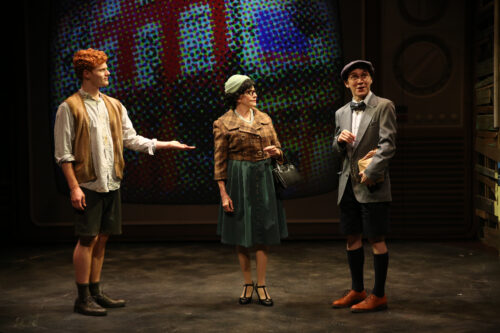 Nicholas Barasch, Michele Ragusa,and Daniel Marconi in The Butcher Boy
Nicholas Barasch, Michele Ragusa,and Daniel Marconi in The Butcher BoyFletcher: The two characters you play in The Butcher Boy are so different. I loved seeing the contrast in your portrayal. Of course, you’re helped in the writing and costume design, but what’s your process for making the character so clearly different when playing more than one onstage?
Ragusa: Well, one of the things that separates the two women I inhabit is the dialect. When we started rehearsals, one had a regular Irish dialect and the other one from Dublin. So, there were vowel changes and such, and I was pitching them very differently to help create a very clear definition of these two women. But a week before previews began, a decision was made that Mrs. Nugent should have a British dialect. And for anyone reading this who’s done dialect work, that change really threw me for a loop. Not that I’ve never done a British dialect, but I had really cemented these two women in vastly different Irish dialects. Luckily, I had two more sessions with our dialect coach, so despite a couple misfires where I’d start to say the line in the Irish dialect, I locked in the new sound. But when examining the two women, it’s too simple to place blame on Mrs. Nugent. I think she’s somewhat misunderstood. Did she create the conflict with Francie Brady? I don’t think she did. She was upset and misspoke, but is that what took Francie down the rabbit hole? She loves her son Phillip fiercely and wants to protect him. Did she set up her son for failure by sending him to school with a blazer and a gold chain? Maybe. But I don’t think it was intentional. Where Mrs. Nugent is a mama bear, Kathleen is much more earthy and easy going. She likes to laugh for sure and she loves her daughter, but it’s in a very different way than what’s happening to the other. I really love stepping into Kathleen’s shoes because she’s just so grounded and earthy. For me, continuing to define the two specifically is how I keep the two separate.
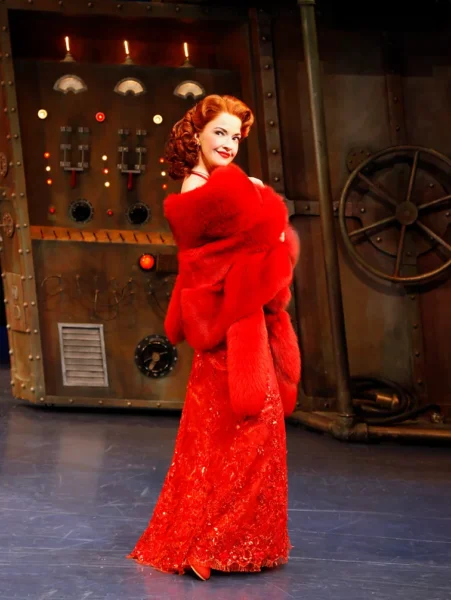 Elizabeth - Young Frankenstein
Elizabeth - Young FrankensteinFletcher: I loved you so much in Young Frankenstein. How does the style of the show affect your creative process? Certainly, Mel Brooks is a far cry from The Butcher Boy.
Ragusa: Yes, Brooks is a whole other animal, so to speak. I really think I’m lucky that I understand vaudeville. A lot of this came from my training. There’s a difference between a vaudeville style of comedy and modern comedy. Having knowledge of how vaudeville plays can really assist you in landing humor for Mel Brooks. It’s old school timing. But I’ve been in the presence of some actors who, on occasion, didn’t get the difference between the two. I learned how to do that; I was taught the different styles of acting, including the variations of playing comedy. Is it not taught anymore? I don’t have the answer to that; I don’t really know. And of course, comedy is much harder than drama. It’s said that it’s easier to make someone cry than to make them laugh — that may be true. But understanding timing and understanding the beats that will line up to create the best laugh you can get are key. Mel Brooks’s humor is Borscht Belt humor, and it’s wonderful to be able to go all the way to the edge, you know? Going all the way to the goal post with your comedy, and yet always remaining full and truthful, that’s a big key for me. I can get my toes right to the line, but it will always be based in truth. It’s not just “waving the rubber chicken,” you know, it’s always based in a truthful reality for the character. The character must really believe that this moment is happening and even though it may be blown way out of proportion, it’s still based in truth. That’s what gives the audience the highest amount of delight, I think.
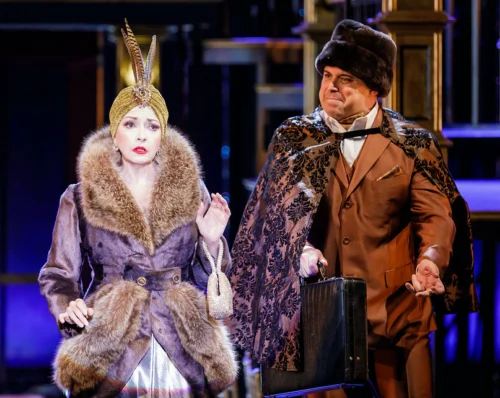 Grushinskya - Grand Hotel
Grushinskya - Grand HotelFletcher: I know you earned your BFA at Niagara University, just outside Buffalo. (And a star-alum at that!) Are you from Western New York?
Ragusa: Yes, and I try to go back at least once a year, if not twice. I don’t have my parents anymore, and cousins have all moved away, but my chosen family is there. So, it’s great to go home. And you know, Buffalo is having quite the renaissance. The city has really rebounded: the food scene, the real estate, I love to go home. And my husband is a huge fan of Buffalo, too. He likes to say that we may be the only two people who discuss the possibility of retiring to Buffalo! And the theater scene, too. There’s so much theater up there.
Fletcher: After you graduated from NU, when you were first out of school, what kind of survivor jobs did you have?
Ragusa: Well, I did that thing that so many students do. They attended the NETC auditions, where basically all the New England theaters come together in a room, and you’re given two minutes to basically show them what you can do. I chose two songs I pasted together. I did a cutting of “Greenfinch and Linnet Bird” into the end of “Adelaide’s Lament.” I think I got something like 15 callbacks! I mean, it was ridiculous; I was blown away. And so, I landed a summer job at the Mount Washington Hotel, performing these little shows in the evening and singing in the dining room. With room and board, that was my first performing job.
When it ended, I went back to Buffalo but knew I wanted to move to New York City. But first, I got a job teaching at Studio Arena at their theater school. David Frank, the executive director at the time, was directing a Glaswegian drama called Men Should Weep. He needed to cast two children in the play, 10 to 12 years old. He asked me if I had any students who’d be able to take on the dialect. So, I pulled some together, and we did some theater games as an audition. Then he asked me to read the scene with them. The next day, he called me into his office and said he had some thoughts about the scene and asked me to read it with him. So, I did, and I think I did an Irish dialect because I didn’t know how a Glaswegian sounded. You know, I just gave it a little flavor. Afterwards, he said, “I think this is gonna sound really crazy, but I think I might be able to cast you as the 10-year-old!” And coupled with another role, the upstairs neighbor. He said if I did it, I’d earn my Actors Equity union card. And as it turned out, I saved a little bit of money from doing the role and from teaching, and, shortly thereafter, I moved to New York City.
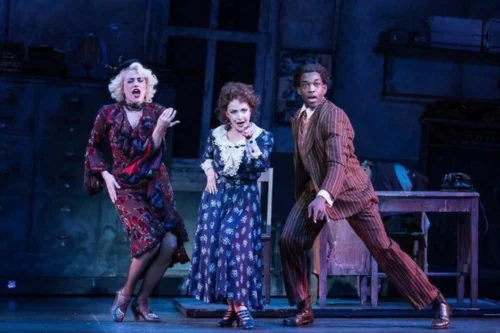 Hannigan - Annie
Hannigan - AnnieFletcher: All by yourself? Did you have any connections there?
Ragusa: Another Niagara alum Army Schultz and his wife, Beth, who worked in casting at ABC Daytime. I went in and met with her, and she showed me how to make a resume and cover letter — she was so helpful and introduced me to some agents. And just like that, I got an agent. It was really fantastic. And I started working right away. It was 1989. My first job was a production of Nunsense somewhere. And between jobs, I waited tables like everybody else. And I’m proud to say, I haven’t waited tables for years.
Fletcher: From the look of your credits, it’s been one constant career of endless jobs. No wonder you haven’t had to wait tables again.
Ragusa: Or saved by Unemployment, which my husband calls the only government subsidy for the arts. That would get me through tough periods, and sometimes it was a little tight, but in the long run, I do feel incredibly fortunate for the career that I’ve had.
Fletcher: How soon did you marry and is he in the business?
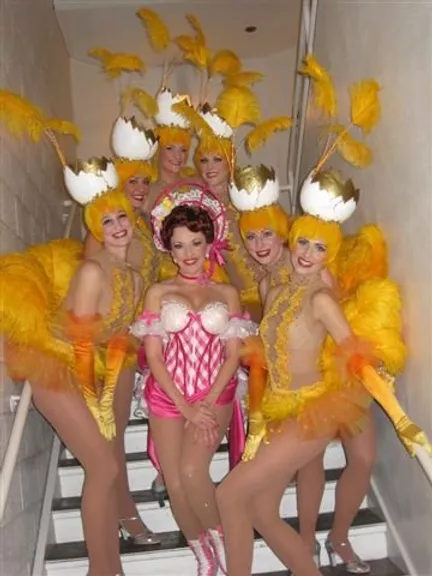 Adelaide - Guys and Dolls
Adelaide - Guys and DollsRagusa: I met my husband in 2000, doing Guys and Dolls at the Dallas Theater Center. We got married in 2002. He’s had a very interesting track in life that took him out of show business into bartending, which has been fascinating and allowed him the opportunity to create Tomr’s Tonic — an artisanal quinine syrup. And now he’s the Ambassador for the Luxury Spirits Division for Gallo. This is absolutely what he was meant to be doing. It’s something totally different. But he misses theater. When we go to see a show, he’s like, “Oh God, I miss it!” But I always say to him, “Well, you’re a man, you can go back in anytime you want.” Men are never too old to be cast. Unlike … well, never mind!
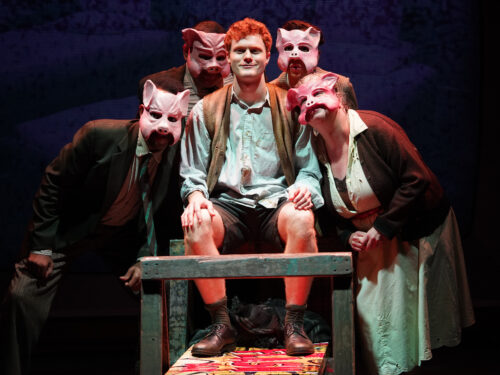 Teddy Trice, David Baida, Nicholas Barasch,
Carey Rebecca Brown, and Polly McKie in The Butcher Boy
Teddy Trice, David Baida, Nicholas Barasch,
Carey Rebecca Brown, and Polly McKie in The Butcher BoyFletcher: Were you involved in any readings or workshop for The Butcher Boy?
Ragusa: No, but I’m pretty sure they’ve done at least one. But I wasn’t involved.
Fletcher: Did you have to audition by sending in a tape?
Ragusa: My first go around, yes. And I’m someone who hates making audition tapes. I know there’s some who actually like it because you can literally do 30 takes until you get it right. But I am someone who needs to be in a room with people. My callback for this was in person, and it went so well, I loved it, and what a difference from a recorded audition the actor makes and sends to your agent. But you have no read on how you did or what they thought. Half the time, you don’t even hear anything back. It feels so unfair to actors to make them record self-tapes. Even for big musical auditions. I had an audition for a production of Gypsy, and I was asked to prepare 23 pages of material. With tracks and hooking up speakers. Plus, you have to deal with lighting, sound, framing the camera, and finding someone who’s available to read with you. I’ve been so lucky because my husband can usually help me. But it’s still a lot. If you’ve got different people you’re talking to, you need someone to look at your eye line to gauge if it looks correct. When you’re in an audition room, you can completely turn your head. But on camera, you just move your eyes. I just can’t wait for self-made tapes to be done.
Anyway, with The Butcher Boy, I went in for the call back, and the next day got the offer. I was like, “Oh, the good old days.” When I listened to the message from my agent with the offer, I sat in my car and cried. I was so just so happy to finally book something because since the pandemic, things have been askew, to say the least. But perhaps we’re getting back to how things were.
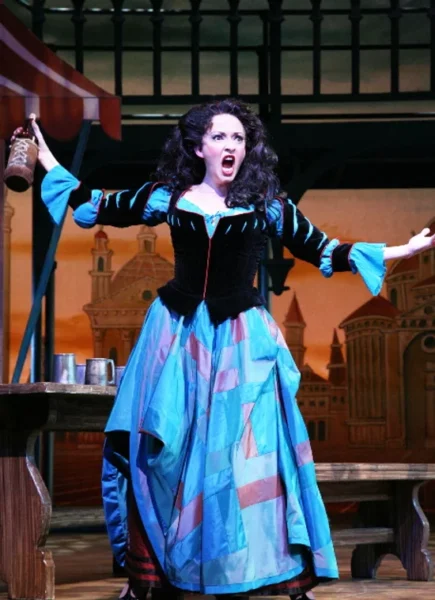 Kate - Kiss Me Kate
Kate - Kiss Me KateFletcher: Did you get to do anything different while staying in during the pandemic?
Ragusa: I was hired to teach voice, virtually, for Ohio University. I’ve never done that before. I gave 15 girls voice lessons, and I picked their repertoire — it was fantastic. I really enjoyed it very, very much. And my girls still reach out to me, you know? Asking if I’m gonna come back, but I just can’t when I’m working because it’s such a huge commitment.
Fletcher: And as happy as I am for those students in Ohio to have the opportunity to work with you, I am even happier that you’re back working. Had you read the book of The Butcher Boy before you auditioned? Did you know the dark subject matter you were getting yourself into?
Ragusa: Well, I read the script and was like, oh, OK, this is interesting. And when I was working with a dialect coach, she looked at the script and asked if it was based on the book and the movie? I was like, “There’s a book and a a movie?” Oh my gosh, I had no idea. So, I didn’t have enough time to read the book at that point because it happened so fast, but I watched the movie. And wow, I was stunned. I mean, who looks at this and sees a musical? Fiona Shaw portrayal and her demise — it scared me. How the hell were they gonna pull this off? Actually, the character of Kathleen doesn’t exist in the movie; I loved that she wasn’t based on any other material. With her, I was free to make her how I felt and believed she would be. And I love Asher Muldoon’s work. My God, he’s not even a senior in college yet. He’s written this whole thing: the book, music, and lyrics — I mean, it’s amazing.
Fletcher: He’s a theater wunderkind, who has created a truly dark theatrical scary-tale — something unheard of.
Ragusa: I think you’re right on that; I mean, the harmonies are tricky, and all of the different kind of melody styles he’s come up with for Francie. Really terrific. And I like that he bounces all over the place because the protagonist isn’t cohesive; he’s clearly suffering from schizophrenia, bipolar, or what have you. It’s never really mentioned or defined, but I think it makes absolute sense that he would have a cowboy style followed by an Irish step-dancing style, and then a beautiful ballad style. Why not!
Fletcher: What kind of prep work do you typically do prior to the first rehearsal?
Ragusa: Well, if I know we have a decent rehearsal period, I’m not one to memorize beforehand. I don’t do that because I like to create with the director. As much as an actor may think all our choices are top notch, they may not be what the director wants. So, I don’t put that on myself. I will definitely have an idea of where I’m thinking the character would be headed, because you’ll be doing a table read the first day, so you want to have some form of a character in big brush strokes. And if the music is tricky, or if there’s a lot of music to learn, like in Mame or Hello, Dolly! or Gypsy, then I’ll start to learn the music so I’m a couple steps ahead. But generally, I don’t tend to do a ton of work till rehearsals begin. I will look at certain things, perhaps, at the time-period, the setting, a little historical research perhaps, like Ireland in the 1960s for example, things of that nature.
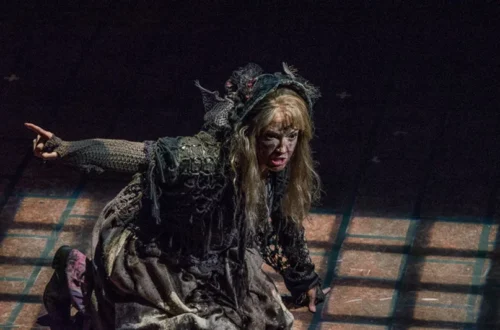 Beggar Woman - Sweeney Todd
Beggar Woman - Sweeney ToddFletcher: You are so theater oriented, how is it stepping into your recent TV credits? How do you like the differences between the two beasts?
Ragusa: Oh, God, such differences! And actually, all the audition self-tapes during the pandemic have lit a fire in me to keep learning about camera work. I’d love to take a class because if all this has taught me anything, it’s learning how vastly different the mediums are. I’d love to learn how to do my style of comedy for the camera, like what Megan Mullally does, that kind of broad, funny, and again, vaudeville type of comedy. That kind of sensibility but for the camera. I’d really like to study with someone who could give me a few more tools for the toolbox. As weird as it sounds, it’s mostly “don’t move your face. Don’t blink. Don’t move your eyebrows.” All of that sort of stuff. It’s been fascinating because something that is absolutely acceptable onstage, recorded on your iPhone, looks like a cartoon character, you know? So yeah, it is vastly a different medium, and I’d enjoy learning a little more of the tricks and tips, so to speak.
Dixie - For the Boys
Fletcher: If you could cast yourself in any role, what would it be?
Ragusa: Well, I have two bucket list roles that I have yet to play: one is Mrs. Lovett in Sweeney Todd, and the other is Little Edie Beale in Grey Gardens.
Fletcher: If you could play opposite anyone no longer with us today, who would it be?
Ragusa: No longer with us today? Alan Rickman.
Fletcher: Is there a role that you’ve played that you’d like to repeat?
Rose - Gypsy
Ragusa: Even though I’ve had the good fortune to play her three times, I can never get enough of Rose in Gypsy. Every time I’ve done it, it’s been such a wonderful, rewarding experience. By the end of Gypsy, and after finishing “Rose’s Turn,” I always felt so elated and so fulfilled. It’s really wonderful as an actor to get to feel that way at the end of a performance.
Fletcher: Looking back, which turning point would you count as your big break? Or maybe there’s a few?
Ragusa: My first Broadway show, Cyrano: The Musical. That was super special for me, to finally have made it to the top of the top. A Dutch production, and our producer was Joop van den Ende, who’s produced many, many other things since then. He was spectacularly generous, unbelievably supportive, a wonderful man, I loved being a part of that.
Another turning point was in 2005 when I did Christopher Durang’s musical Adrift in Macao [first at Philadelphia Theatre Company and two years later at Off-Broadway Primary Stages]. To get to work with Durang side by side and to have my work recognized by my peers [winning a Barrymore award and later two nominations for both Lortel and Drama League awards], it was such an honor and a big moment in my career. Probably, the next big turning point for me was Young Frankenstein, being hired by Mel Brooks and replacing a celebrity with photos outside the theater — that was a first for me.
Corinna - Adrift in Macao
Fletcher: Who helped train you for the theater? Did you have a role model at the beginning of your career? Someone you look up to and admired?
Ragusa: First and foremost Bro [Brother Towey] and Tim [Ward] in the BFA program at Niagara University. They trusted and believed I could do things that I didn’t believe I could do myself. Especially Tim, who was always casting me in plays where I doubted if I could play the role. He cast me in Agnes of God as Mother Miriam Ruth. I remember crying because I felt like I couldn’t do it. But he totally believed in me and pushed me to do it. And in the end, he was right. Both of those men live in my heart today. Five years ago, I was sitting in a greenroom when an orchestra member came in and asked, “Is Michele Ragusa here?” Apparently, she was something of a medium. And when she approached, she told me, “I don’t know if this means anything to you, but Bro-Tim are so happy for you.” I thought to myself, Bro-Tim? Oh my God, Bro and Tim! I about fell out of my chair with tear-filled eyes. It was so beautiful. She thought she had upset me, but I was like — no, no, no. It was just really moving.
Also, Meryl Streep was a major role model for me. I remember seeing her in Sophie’s Choice when I had been touring all over Europe in West Side Story. I remember thinking, who is this? Never imagining she was American; I couldn’t believe it. That moment defined what acting was for me. Also, the fact that she does comedy and drama, I love that and wanted to do the same. If casting people let you. Sometimes, they like you to do just one thing, which simplifies choices for them. When they consider me a comedian, then all of a sudden I’m not considered for a dramatic role, or vice versa. She’s funny, does she do drama? Or she’s a soprano; she’s not funny.
Fletcher: Typecasting is so limiting. I like it better when actors are allowed to act. Casting seems to be tightening up these days.
Ragusa: I think that it’s just easier for casting when an actor can do one thing really well. It’s when you do a variety of things that you need to sometimes fight to be seen for projects.
Fletcher: And “a variety of things,” you absolutely do “really well.” Meryl would be proud. But even more so, I’m sure many up-and-coming thespians include you on their own personal list of theater folk they admire and inspire to be.
#################################
photos of Michele Ragusa courtesy of the artists
photos of The Butcher Boy by Carol Rosegg
The Butcher Boy
Irish Repertory Theatre, 132 West 22nd Street, NYC
ends on September 11, 2022
for tickets, call 212-727-2737 or visit Irish Rep
follow Michele at Michele Ragusa
find Gregory Fletcher at Gregory Fletcher Facebook and Instagram
